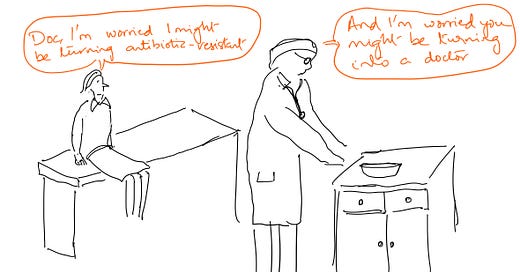Envy is meaningless
A successful executive may be going through the motions with his work, may be holding on to a position for a future reward, or may be worried sick about he is being perceived by colleagues. A young intern in the same executive’s team may find the opportunity to work with people he can soak up learning from and apply it in the real world an experience so delirious he can barely sleep at night.
On the surface, it is easy to guess which of the two would want to swap places. But in reality, is it as obvious?
It is not objective conditions but what we make of them that determine our level of enjoyment. It is such an empowering thought yet so easy to forget.
When we experience a state of flow and understand the meaning of it in our lives, envy becomes meaningless.
Death by a thousand paper cuts
Your countless ice-cream decisions that have killed your one university decision.
We’ve moved from a relative abundance of time and scarcity of resources to an abundance of resources and scarcity of time.
Because this has happened pretty quickly relative to evolution, our brains haven’t made the switch yet. Our back-dated brains still push us to use up our time and brainpower getting a thousand trivial “which flavor of ice cream to order?” decisions absolutely right. And we end up with nothing in the tank for the one big “which university to go to?” decision.
We live in an age of endless options, and thanks to our maladjusted brain we’re forever locked in mental computations for things that should not matter. In looking for perfection in trivialities, our thinking barely makes the cut on the few truly important matters. Our body budgeting--how much to allocate to what activity--is out of whack with the reality we live in.
A good start to get a grip on this is to beat Fredkin's Paradox: the more similar two options seem, the harder it is to choose between them even though the choice matters less.
In an earlier age of scarcity, this paradox didn't matter because we didn’t have options in ice-cream flavors. In an age of abundance, it can bring us death by a thousand paper cuts.
You’re not safe from your own mythology
No matter who you are, as long as you’re human, it is hard to change your mind in step with reality.
It is hard for the conventional-minded to update their beliefs because they have inherited their beliefs from someone famous and revered, like the rest of society has. So unless that someone revered changes their mind, the conventional-minded are not going to cosider a rethink either.
But it is also hard for the free thinkers and the unconventional-minded to change their minds. That's because they’ve worked much much harder than the rest of us to form their beliefs. They have rejected conventional wisdom and questioned society on the path to their set of beliefs. So, of course, it is not easy to give up something you’ve worked so hard for.
Your mind, a delusion container
Your mind is a delusion container.
Whatever information it receives, it shapes it to fit the container. What it can’t fit, it chucks out. What stays in is not reality but an altered version of it–a delusion. But you believe in it exactly as it sits inside of you.
The next time round, new information that comes your way has to dovetail your beliefs or else it is deemed garbage. Soon enough, you are the proud owner of a delusion container.
Your doctor is a tailor
Learned this from Dr. Victor Montori, a champion for shared decision-making in patient care.
❌Your doctor is not a storewalker rattling out sizes and prices of suits for you to pick off the shelf. Take it or leave it.
❌Your doctor is not someone who at most can offer you minor alterations on what is available in the catalog of treatments. The offer-er of the best compromise.
✔️Your doctor is a tailor who sits with you from the very begining and asks you, What kind of suit do you like? What kind of fit? What fabric?, and combines the information with their good judgment to propose the best suit for you. A proponent of shared decision-making.
In 2022, my wife had this bizarre but commonplace experience when her vascular surgeon flat-out rejected the treatment outcomes she wanted from the surgery. He imposed his own as if she didn’t know what she wanted from an elective surgery. This surgeon was nothing more than an uncaring storewalker in my book.
Let’s not assume my disaffection makes sense. Why listen to the patient? Isn’t the doctor the expert?
Every clinician wants to be a great doctor. No one grows up wanting to be a great patient. Therefore, in the practice of care, the patient is always the kink in the hose. If they don’t comply, if the treatment doesn’t fit their lifestyle, the treatment will fail. The doctor will fail. So, fix the kink in the hose. Listen to the patient.
👋Hi, I’m Satyajit and thank you for your time. I learn from the best with the goal of unpacking lessons that help make decisions for a better career and a better life.





"Every clinician wants to be a great doctor. No one grows up wanting to be a great patient. Therefore, in the practice of care, the patient is always the kink in the hose. If they don’t comply, if the treatment doesn’t fit their lifestyle, the treatment will fail. The doctor will fail. So, fix the kink in the hose. Listen to the patient."
Your story logically concludes this way. I am thinking of a parallel in some other context, not able to come up. Anything you can suggest?